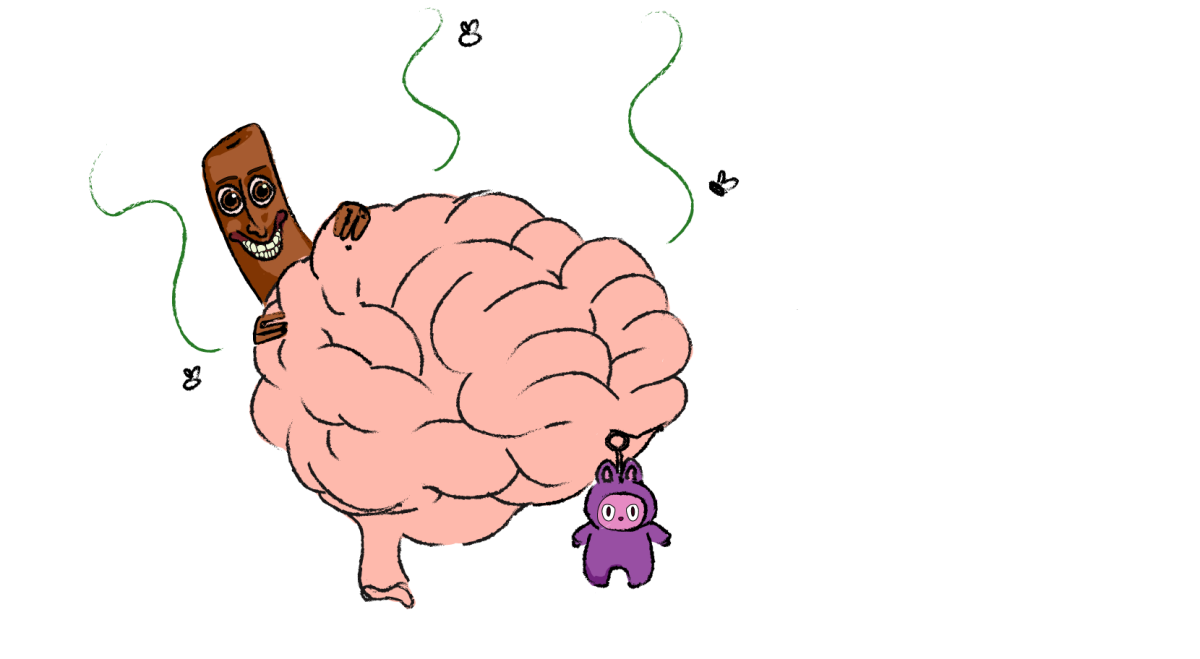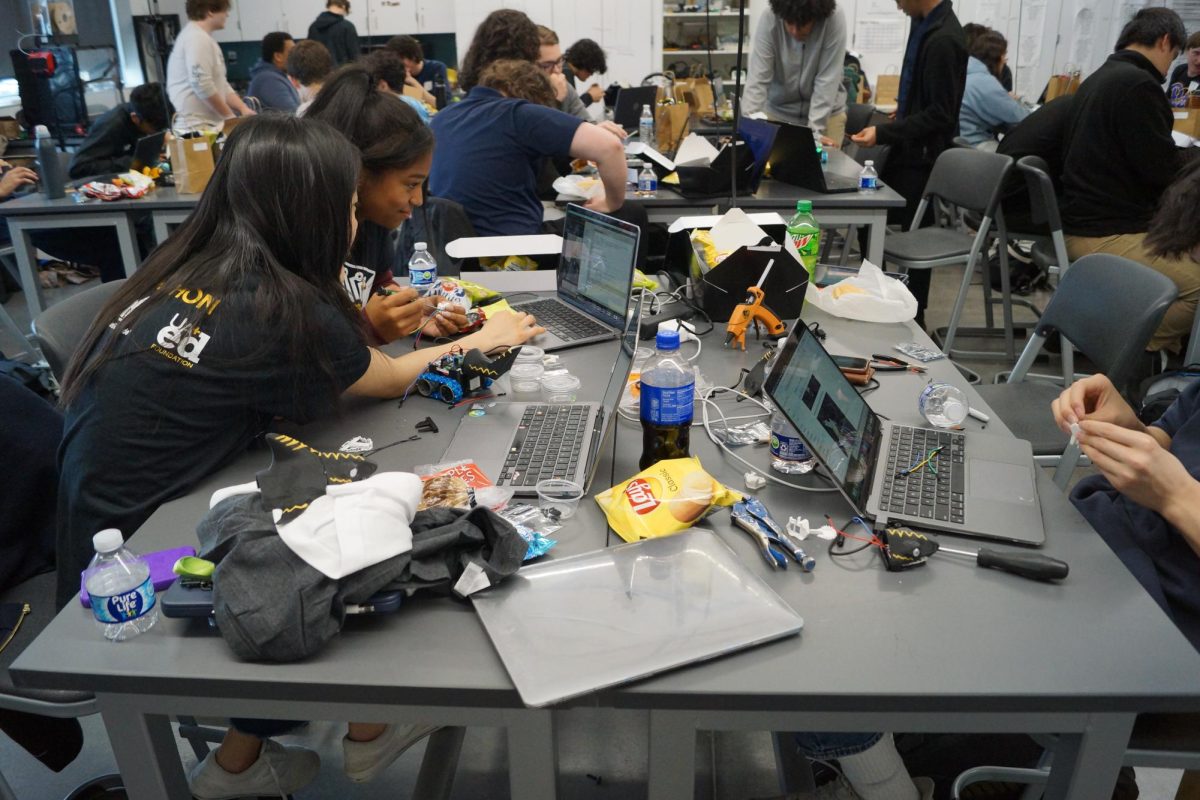Socializing 24/7, dopamine addictions, a world where one can look like anyone they want and be whoever they choose. A world that almost every person is a part of, yet no one actually exists in. A person slowly prioritizes the internet world, while simultaneously forgetting how to exist in the other world beyond it reel after reel, app after app. Generation Z (Gen Z) has been placed in the middle of both worlds, from growing up without a phone to now not knowing what one’s hand looks like without one. As childhood ended and teenage years began: Barbies, Beyblades, Hexobugs, Pollypockets, Silly Bands and Rainbow Looms one day were replaced with TikTok, Snapchat, Pinterest and Instagram. But suddenly, when the objects most teens have become attached to start to get locked away in backpacks from 8:05 a.m.-3:05 p.m. five days a week, they are forced to open their eyes. But where does that leave students?
THE TROUBLES OF TECHNOLOGY
Phones have become an inseparable part of teenagers’ daily lives. The majority of the time students spend revolves around technology, specifically smartphones. Whether at school, at home or with friends, phones are constantly within arm’s reach. Many people have become dependent on online resources for communication, information and entertainment. Even though phones are extremely convenient, they can create many challenges when it comes to living in the moment and being connected in the nondigital world.
Today, being online is how relationships can be made and simple daily tasks are completed. Social media apps and online games are continuously keeping kids engaged, pulling them away from in-person interactions. For many obvious reasons, getting rid of technology isn’t an option; it helps to stay informed while also providing an easy way to communicate. But it’s important to wonder: how does technology harm its users and what will help loosen the grip it has on teenagers?
In recent years, individuals often spend more time on screens rather than bonding with loved ones and peers. Technology can create a sense of isolation and reduce face-to-face interactions, leading to feelings of loneliness and social disconnection. Although phones are an essential part of most people’s everyday lives, the importance of family and in person connections outweighs the appeal of technology. Lauren Toben, a professor from Miami University and psychologist, shared how she has interacted with her students and how the most memorable moments don’t include devices.
“If I ask people to think through, what are the last 20 things that you’re grateful for that happened in the last 24 hours? It’s never anything that happened on their phone,” Toben said.
Even though many real life memories and experiences outbalance the need to spend countless hours on your device, devices offer immediate gratification, but can’t provide lasting joy or fulfillment.
It’s not hard to admit that some online games and apps can feel like the most important thing in the world when engaging. It can feel like time stops and nothing else truly matters. Yes, gaming can help with critical thinking and problem-solving, but it also takes away from life outside of a device. Zoning out while online leads to mindless scrolling and hours of unnecessary screen time.
Doomscrolling has been a recent topic of conversation among many teens. The University of Colorado Denver defined doomscrolling as excessive or uncontrolled time online that has no purpose other than consuming negative news. A Ph.D. student from The Ohio State University, Razieh Poursafshari, shared how phones can turn into an easy escape from life when students feel extremely anxious or depressed.
“You are anxious, you have an important exam coming up, and you don’t know what to do with yourself. You grab your phone because it is the easiest thing to have access too,” she said.
Using technology as a coping mechanism for life’s challenges can overall lead to the inability to break away from phones. Over time, this can replace healthy ways to manage stress, such as reflecting, exercising and talking with peers. This can result in individuals being unable to face problems without the comfort and constant distraction of a screen.
The new phone ban in Ohio has shown just how much control technology has on humans. As teachers pace during lunch periods, students still manage to find a way to glimpse at their phone. The instant satisfaction of screens keeps people, always coming back for more.
Many people think pulling out a phone to catch a moment they want to remember isn’t harmful. In fact, people rely on technology to capture all of the important aspects of life. From daily reminders to pictures of a pretty sunset from vacation, phones are heavily trusted to keep people in order. Having technology to help guide students is generally a good thing, but it can lead to harmful situations. Often, people are so focused on capturing a moment that they never get to fully experience it. Poursafshari also shared her input on using technology to retain memories.
“We lose those moments because we never really get the time to go back and look at all those photos,” Poursafshari said.
Since life is constant, there are rarely times to slow down and relive the adventures caught on camera. Taking pictures is a great reminder of experiences, but living through a screen is undeniably taking away from time as it passes by.
Another thing that many people experience daily is fear of missing out (FOMO). Since people tend to communicate online, being without a device for too long often leads to worries of being disconnected from peers. The pressure to stay constantly connected is always lingering, directly affecting screen time and leading to increased online activity. It is more than common for people to feel anxious about missing social gatherings, trending topics and updated news. While it may feel like staying connected online is above all else, it can reduce the time spent creating real-world relationships and memories.
Notifications can also play a huge role in being involved more online rather than offline. No matter what the notification is, it gives people the sense of urgency to open their phone. According to The Columbia University Department of Psychiatry, the FOMO and urgency of notifications can lead to elevated levels of anxiety and stress. Over time, notifications find a way to pull people out of the moment and back onto their screens. Technology will never go away, but learning how to balance screen time with real life is crucial. Being in the moment will always matter more than likes, notifications or daily online updates.
As time continues to move, it is a common feeling for people to look back and wish they had truly lived in the moment rather than disassociating online. Most things that are looked back on are memories cherished with loved ones and the feelings we felt during them. Watching life pass by through a filtered lens is not only taking away from the real beauty of life, but also creating feelings of regret from not being present.

LIVING BEFORE REGRET
The phrase “live in the moment” is something most have probably heard repeated hundreds of times. People’s parents may tell them to put their phone down at a concert and simply enjoy the music, or not to fear what comes ahead – which for many upperclassmen is college. For some, this is a motto they live by, while for others it’s simply a repeated mantra that carries little to no importance.
A good portion of our lives are spent doing things without intention behind them. The average person spends about 26 years of their life sleeping, and about five hours a day on their phones. Another large portion of our lives are spent looking towards what is to come, eagerly anticipating.
Freshman Olive Bachey explained what living in the moment means to her, as she wonders what is to come for her in the next four years at Upper Arlington High School.
“Living in the moment for me means just understanding that I’m a freshman and my worries don’t really matter. I know when I look back on freshman year and the next four years as a senior, I’ll really appreciate those moments and what I had. My sister just left for college and seeing how fast time goes by makes me realize I need to live in the moment more,” Bachey said.
For Bachey, some of the best things she is looking forward to are joining clubs to get connected and attending sports games.
“I want to make sure I go to as many athletic events as I can. I have a lot of friends that are a part of different sports and I want to be there to support, and I definitely want to get good grades too,” she said.
In order to keep herself stress-free about the future as well as her coursework, she gives herself a simple reminder.
“My advice to myself is probably just to not stress too much and just accept what’s happening right now because everything’s meant to happen where you are,” Bachey said.
In regards to how the phone ban is going to affect this year’s students, it hasn’t been a big adjustment for many freshmen as phones weren’t allowed in middle school, with the exception of lunch.
“I personally think it’s helped because in middle school phones were kind of allowed and at lunch we were on our phones usually, but not being on our phones at lunch [anymore] I think has helped a lot. At first I was kind of disappointed because I heard you can have your phone in high school, but I’ve definitely been in the moment more and been able to just have more fun with my friends,” Bachey said.
While the freshmen focus on looking forward and living in the moment, graduating seniors focus on missing out and regretting high school experiences that weren’t lived to the fullest. The Class of ‘26 focuses on their last first days caught between looking back with nostalgia and looking ahead to what comes next.
At the end of the year, some may regret simple things like test scores or not attending as many football games as they intended. For graduated senior Sarah Snider, her involvement at UA has left her with little regrets of her high school experience. Her participation in UA leadership as a class officer, link crew leader, yearbook editor and speaker series member as well as other opportunities shaped her high school years.
“I think if you ask Mrs. McGinty she would probably say I was one of the most involved. I had fun in anything that I did because I was willing to put effort into it,” Snider shared. “I think getting involved is really important. It’s a great way to meet people.”
One of the best things you can do to live your high school experience to the fullest is getting involved – join that club, apply to that leadership program, play that sport.
“I was also involved with the swim team and water polo team. There’s no one else I would have rather spent time with,” Snider said. “My biggest accomplishment in high school was winning two state championships in my time [at the high school] and one runner-up too. It was one of the best experiences I could have had, having that be my legacy. Once you’re part of the state championship team you have that forever – knowing that all that hard work paid off and [getting to hold] the trophy.”
Because she was brand new to the district as a freshman, Snider involved herself in everything she could to continue meeting people and growing connections. Because of her involvement, Snider loved her high school experience. However, if she was able to do it again, she would in a heartbeat.
“If I could relive one year I would relive freshman year because I was really shy when I first moved here. I learned pretty quickly there was no reason to be that shy, so I would try to be more outgoing at the beginning,” Snider shared. “I also definitely regret skipping some classes senior year, but I also feel like it’s kind of like something that’s expected of ‘senioritis.’ I do wish I went to class like one more time. If I had the opportunity I would go back and I wouldn’t have skipped class,” she said.
Luckily, Snider’s regrets of her high school experience do not outweigh the positives. It is important to keep in mind, though, that life moves fast, and opportunities can pass before most even notice. Taking time to slow down and focusing on the present allows us to fully experience each moment and avoid the regrets that come from rushing through life and high school.

TIME TO SLOW DOWN
Students are constantly faced with decisions regarding their future throughout their whole high school careers. It can feel overwhelming because of all the purposeful things that occur during this time.
Academics, sports and the relationships that are made now will define how someone approaches their future. In this time of life, it is easy to breeze through special moments because the stress of the future is over taking thoughts and moods.
For those reasons, it is important to slow down and cherish each moment because they will not last forever. As Upper Arlington’s Alma Mater says:
“The care-free days of high school days, we leave with deep regret. The days of yore will be no more, but through the coming years, the thought of you and friends so true, will bring us joy and tears.”
-Upper Arlington Alma Mater
The years of high school fly by, but the memories that are made become some of the most cherished. It can be hard to enjoy these years when the weeks are slammed with homework, games and events. In stressful times, it can be hard to find an escape to decompress. Senior Finn Ferguson commented on how he slows down in the fast paced world.
“I have been [meditating] for almost a year and a half, and I do it every night,” Ferguson said. “It really helps me reduce my stress and grounds me and kind of is a way to forget about all the pointless things that freak us out.”
Meditation does more than just slow down time – Ferguson mentioned that he has noticed a difference in his academic performance.
“I would just do better on tests overall,” Ferguson said. “It really comes down to the fact that it is helping my focus.”
Practices like meditation and exercise both help with removing the anxiety of the future. At the high school, if a student is feeling stressed they have the resources at the high school to help with relaxing. During lunch periods students can go into the competition gym to get energy out. Additionally, the Bear Pause room is an excellent calming space that students can visit.

Betsy Youse, a licensed independent clinical social worker, is a mental health specialist here at UAHS. She is familiar with the Bear Pause room and believes in the support it offers to all students.
Youse’s room is located on the third floor student services. The Bear Pause room is located next to the college center.
In the Bear Pause room, students are allowed to do anything they believe will help ease their mind. They can color, fidget or just close their eyes.
“We have something called Heart Math which is a data-driven proven, effective way to lower your heart rate and reduce your anxiety by focusing on some simple visions on the screen and doing some tasks that cause your thinking to slow down and focus,” Youse said. “It’s a form of biofeedback, and we really encourage people to use it if they are comfortable doing it.”
If you practice meditation, the Bear Pause room is an open space where you have the ability to. To do so, make an E-Hall Pass on your school ipad.
“If you are into meditation, they have posters of basic breathing exercises and different sheets for you to follow,” Youse said.
Whatever the stressful situation is, it is important to remember you only have control of your breathing and your thoughts. Removing the additional stress of technology can be the first step into finding how to cope with your own thoughts and breath. Learning to sit with your thoughts and eventually challenge them is a key step to slowing down.
The main goal of the Bear Pause room is to help students feel like they aren’t restricted to feeling their emotions. It can be easy to forget that hardworking students need breaks too, and the Bear Pause room is there because emotions fall over us at any given time in the day. Emotions are unpredictable, but the Bear Pause room isn’t.
“If you need to take time to check in with yourself, there is nothing wrong with walking into the Bear Pause room and having fifteen minutes to just zone out,” Youse said.
…
It can be difficult to prioritize the present when there are so many other aspects of life pulling one’s attention anywhere but the moment. Students have been in the middle of all the chaos. Nicholas Komjati, a language arts teacher at UAHS, has been assigned lunch duty during fourth period lunch.
 “The law and the rule is stating that phones have to be away from the beginning to the end of the school day, and so that includes lunch, so [being a phone police] has naturally become a part of [lunch duty],” Komjati stated.
“The law and the rule is stating that phones have to be away from the beginning to the end of the school day, and so that includes lunch, so [being a phone police] has naturally become a part of [lunch duty],” Komjati stated.
Because of his integration in the lunch system, Komjati observes the activity of the lunchroom with the new phone ban.
“[There is] just a lot of general socializing. I see a whole lot more decks of cards and poker chips and stuff like that. I think people are finding other ways to entertain themselves,” Komjati said. “They’re playing little quiz games or whatever like through the iPad. But all of those things are social and collaborative and they’re socializing with other people during that time instead of just isolating themselves.”
Though taking away phones can be seen as a step in the right direction, the effects of phone withdrawal has created a counterproductive result to this solution.
“When [a phone is] taken away, it is very much like the same behavior as an addict of anything else where they’re just kind of like waiting for the next dopamine hit,” Komjati commented.
Students now have not only been deprived of a main source of communication, but also can start to isolate themselves from the outside world, putting themselves in a state of constant anticipation.
“Oftentimes in class students are sometimes just waiting [teachers] out, and they’ll just kind of sit and zone out… And so I think part of the hope is that if it’s gone from eight to three, if those dopamine hits are fewer and further in between, that maybe that engagement and participation in class will get better,” Komjati said.
Though the phones can be blamed for a majority of issues relating to being present, many factors go into putting your mind and body in the moment. High school students are faced with several of these factors, but unlike some, students can directly impact their awareness of their surroundings. Just simply putting the phones away highlights how often people check their phones, experience periods of inattention without them, and look forward to using them again.
It can often be difficult to adjust, disconnecting from the online world and reconnecting with the physical world is an immediate way to influence the quality of a person’s life. Small things—such as games, laughing, talking, reading or even just sitting and thinking—often seem boring compared to what’s on a device. Yet, these are the things that seem to be the source of genuine experiences. They bring people a step closer to living like a kid again: resorting to random activities just for entertainment, talking to siblings, playing with neighbors or making potions in the yard. The older someone gets, the farther away childhood can feel. Just by looking up from the screen, they can notice that pieces of childhood are actually integrated into a person’s daily life they have just been too distracted to notice.









